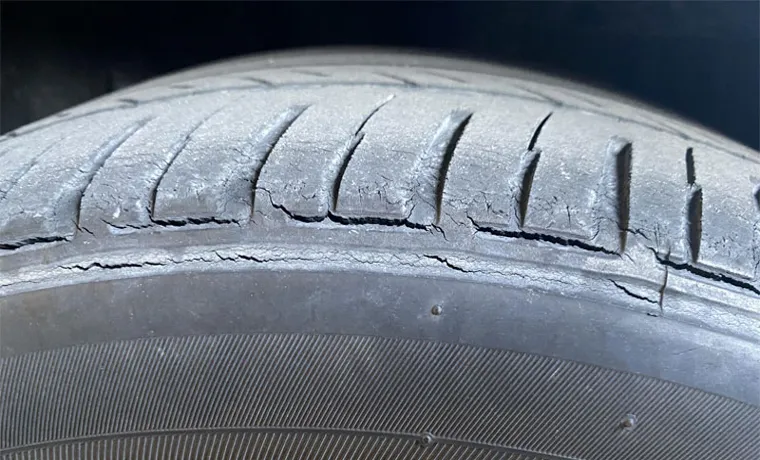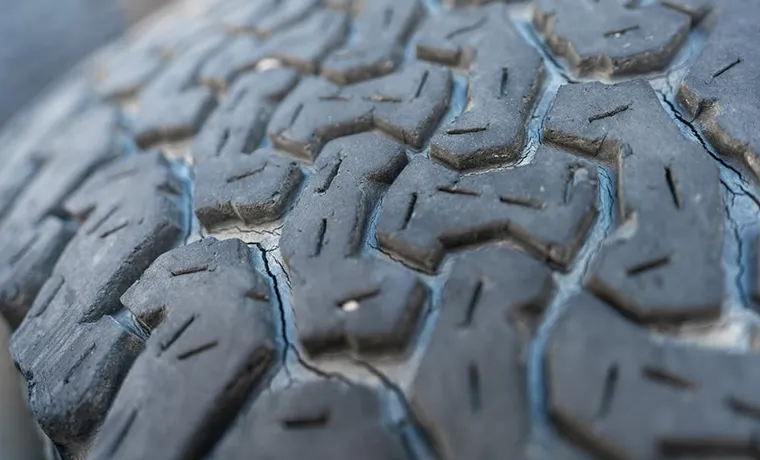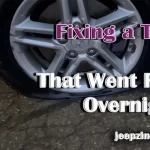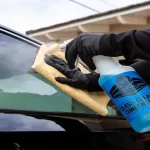Have you ever noticed that your tire seems to have cracks in it? It can be concerning, especially if you’re not sure what’s causing them. But don’t worry, you’re not alone. Many drivers wonder why their tires are cracking and what they can do about it.
Tires are an essential part of any vehicle, and keeping them in good condition is crucial for safety and performance. However, they are also exposed to various environmental and physical factors that can cause them to wear out over time. One of the most common issues is tire cracking.
Tire cracking happens when the rubber compounds in your tire degrade and cause small fractures on the surface of the tire. These cracks can occur due to various reasons, including exposure to sunlight, heat, and ozone, as well as age and wear and tear from driving. While some tire cracking may not be a cause for concern, severe cracking can affect your tire’s performance and safety, leading to problems such as blowouts and punctures.
It’s essential to keep an eye on your tires and get them checked by a professional if you notice any significant cracking. In this blog, we’ll take a closer look at the causes of tire cracking, the different types of cracks you may encounter, and what you can do to prevent tire cracking from happening. By the end of this blog, you’ll have a better understanding of why your tire may be cracking and what steps you can take to keep your tires in top shape.
So, buckle up and let’s get started!
Table of Contents
Understanding Tire Cracking
If you notice small cracks in your tire’s sidewall, it’s important to understand that tire cracking is a common and natural occurrence. Tire cracking happens as a result of exposure to sunlight and air, causing the rubber to lose its elasticity over time. This process is known as oxidation.
Tire cracking is prevalent in older tires, but low-quality tires may experience it sooner than expected. It’s crucial to replace tires with cracks, as they are more susceptible to punctures and blowouts, leading to dangerous road situations. To avoid premature tire cracking, it’s recommended to park vehicles in shade or garages, use tire covers, and avoid harsh chemicals when cleaning the tires.
Also, choose high-quality tires that are designed to last long and reduce the chances of cracking.
Causes of Tire Cracking: Age and Exposure to the Elements
Tire cracking is a common problem that occurs when tires are exposed to the elements for an extended period of time. Age and exposure to the sun, heat, and cold can cause the rubber compounds in tires to break down and develop small cracks. The longer the tires are exposed to these conditions, the more severe the cracking can become.
Tire cracking not only affects the appearance of the tire but can also compromise the structural integrity of the tire, leading to blowouts and other safety hazards. One way to prevent tire cracking is to store tires in a cool, dark place when not in use and to regularly inspect tires for signs of wear or damage. It’s also important to replace tires before they exceed their recommended lifespan, typically around six years.
Keeping up with tire maintenance can help ensure that your tires are safe and in good condition for the road ahead.

Causes of Tire Cracking: Overinflation and Underinflation
Tire cracking is a common issue that occurs when the rubber on your tires starts to deteriorate, causing visible cracks on the surface. One of the leading causes of tire cracking is incorrect tire pressure. Overinflation and underinflation can both cause your tires to crack.
When a tire is overinflated, it puts too much pressure on the sidewalls, causing them to flex and crack over time. On the other hand, when a tire is underinflated, it puts too much stress on the tread of the tire, causing it to wear out faster and expose the cords underneath the rubber surface. This can lead to grooves and cracks on the tire’s surface.
To avoid tire cracking caused by incorrect tire pressure, be sure to check your tire pressure regularly and inflate them to the manufacturer’s recommended specifications. By doing so, you can prevent unnecessary stress on your tires and ensure that they are in good condition for longer.
Causes of Tire Cracking: Improper Storage and Maintenance
Tire cracking is a common issue that many vehicle owners face, and it can be caused by a variety of factors. One of the primary causes of tire cracking is improper storage and maintenance. When tires are not stored correctly, they can dry out and become brittle, which can lead to cracking.
Additionally, if tires are not maintained properly, they can become damaged and develop cracks. This is why it’s important to regularly inspect your tires for signs of wear and tear, and ensure that they are stored correctly when not in use. By taking these simple steps, you can help to prevent tire cracking and ensure that your vehicle is safe and roadworthy.
Types of Tire Cracking
If you’re noticing cracks on your tires, it’s essential to understand that there are different types of tire cracking. The most common kinds are weather cracking, sidewall cracking, and tread cracking. Weather cracking occurs on aging tires that are exposed to extreme temperature changes, sunlight, and moisture, causing the rubber to deteriorate and develop cracks.
Sidewall cracking is noticeable on the sides of the tires and usually caused by underinflation, which puts added stress on the sidewall’s flex points, leading to cracks. Tread cracking, on the other hand, is often the result of overloading or improper inflation, causing the tire’s central part to weaken and crack. To avoid tire cracking, it’s vital to maintain proper tire inflation, check for damages, and regularly replace aged tires.
A well-maintained tire can last much longer and provide better performance while keeping you safe on the road.
Sidewall Cracking
Sidewall cracking is a common issue that many drivers experience with their tires. This can happen due to a variety of reasons such as exposure to extreme temperatures, prolonged use, and lack of maintenance. There are different types of tire cracking, including weather cracking, ozone cracking, and sidewall bulges.
Weather cracking occurs when tires are exposed to harsh weather conditions such as extreme heat or cold, causing rubber to harden and crack. Ozone cracking is caused by exposure to ultraviolet rays which break down the rubber molecules, resulting in tiny cracks along the sidewall. Sidewall bulges occur when air pressure in the tire is too low or fluctuates, causing the tire to flex and form a bulge on the sidewall.
It’s important to regularly inspect your tires for any signs of cracking or bulges to ensure your safety on the road. If you notice any signs of cracking or bulges, it’s recommended to replace your tires immediately to avoid the risk of a blowout.
Tread Cracking
Tread cracking is one of the most common issues that drivers face with their tires. This is because it is caused by a variety of factors, including age, exposure to harsh weather conditions, and poor maintenance. There are different types of tire cracking that drivers should be aware of, such as weather cracking, sidewall cracking, and tread separation.
Weather cracking happens when the tire’s rubber deteriorates due to exposure to sunlight, ozone, and other weather elements. Meanwhile, sidewall cracking occurs when the side of the tire becomes weak and starts to crack, reducing the tire’s structural integrity. Finally, tread separation is when the rubber on the tire’s tread separates from the steel belt underneath, which can cause a dangerous blowout.
Overall, drivers should regularly inspect their tires to ensure they are in good condition and replace them if necessary to prevent any mishaps on the road.
Preventing Tire Cracking
Tire cracking can be a frustrating issue for car owners, as it can lead to loss of tire pressure and decrease the overall lifespan of the tire. There are a few different factors that can cause tire cracking, such as age, weather conditions, and insufficient maintenance. One way to prevent tire cracking is to make sure your tires are properly inflated and rotated regularly.
This will help distribute the wear and tear on the tires evenly and reduce the risk of cracks forming. Additionally, parking in a shaded area and avoiding exposure to extreme temperatures can also help prevent tire cracking. If you do notice cracks forming on your tires, it is important to have them inspected by a professional as soon as possible to prevent further damage and ensure your safety on the road.
Regular Maintenance and Inspection
Regular tire maintenance is essential for preventing tire cracking, which can lead to a dangerous blowout. One of the easiest ways to avoid tire cracking is to keep your tires properly inflated and rotated. Low tire pressure and excessive wear and tear can put extra stress on the tire, causing it to crack and fail.
It’s also important to inspect your tires regularly for any signs of cracking or damage. Look for any bulges or cracks in the sidewall, and if you find any, don’t hesitate to replace the tire. Additionally, try to avoid parking your vehicle in direct sunlight for extended periods of time, as the heat can cause the tires to dry out and crack.
By taking a few simple precautions, you can significantly reduce the odds of tire cracking and ensure that your tires stay safe and reliable on the road. Neglecting regular maintenance and inspections can result in serious and costly consequences, so don’t put it off any longer. Get your tires checked out today, and keep them in top condition to enjoy a smooth and worry-free driving experience.
Remember, prevention is key when it comes to tire cracking, so invest a little time and effort in maintenance now to avoid bigger problems down the road.
Proper Storage and Usage Habits
Proper tire storage and usage are critical in preventing tire cracking. The best way to store tires long-term is to keep them in a cool, dry place away from direct sunlight and heat sources. Tires should be stored vertically and inflated to their recommended pressure to maintain their shape and prevent cracking.
When it comes to usage, drivers should make sure their tires are properly inflated and not overloaded, as this can cause excessive stress and lead to cracking over time. Additionally, avoiding harsh driving conditions and regularly inspecting tires for wear and tear can also help prevent cracking. By taking these simple steps, drivers can ensure that their tires remain in good condition and reduce the likelihood of costly and dangerous tire failures on the road.
Conclusion
In conclusion, your tire cracking is like a fine wine—it gets better with age. Just kidding, that’s not true at all. Tire cracking is actually a natural process that occurs over time due to a number of factors, like exposure to sunlight, heat, and friction.
It’s your tire’s way of telling you that it’s time for a replacement. So, don’t ignore those cracks, instead, give your tire the retirement it deserves, and treat yourself to a new set of wheels. Your safety and wallet will thank you in the long run.
“
FAQs
What causes tire cracking?
Tire cracking is caused by various factors such as exposure to sunlight, heat, and chemicals, as well as aging and overloading of the tire.
How can I prevent my tire from cracking?
To prevent tire cracking, you should regularly clean your tires with mild soap and water, avoid parking your car in direct sunlight, use tire protectant products, and make sure to inflate your tires to the recommended pressure.
Is tire cracking covered by warranty?
Tire cracking is typically not covered by warranty as it is considered normal wear and tear. However, some tire manufacturers may offer limited warranty coverage for a certain period of time.
Can tire cracking cause a tire blowout?
Yes, tire cracking can weaken the tire and increase the risk of a tire blowout, especially when driving at high speeds. Therefore, it is important to regularly inspect your tires for any signs of cracking.
How do I know if my tire cracking is severe enough to replace the tire?
If the tire cracking is more than 2/32 of an inch deep, you should replace your tire as soon as possible. Additionally, if the cracking is located in the sidewall or near the tread, you should also replace your tire to avoid any potential safety hazards.
Are all types of tire cracking the same?
No, there are different types of tire cracking such as weather-cracking, ozone-cracking, and heat-cracking, each with its own unique causes and prevention methods.
Can tire cracking be repaired?
No, tire cracking cannot be repaired as it is a sign of tire damage and wear. The only solution is to replace the tire to ensure safe and reliable driving.



